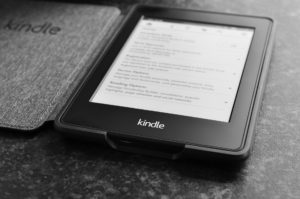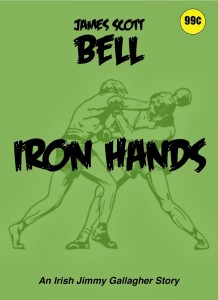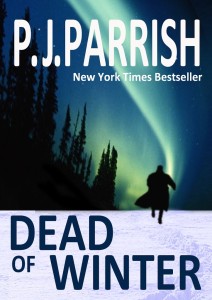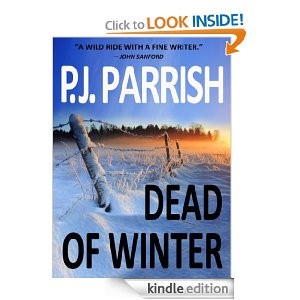by James Scott Bell
@jamesscottbell
 There are three kinds of people in the world: those who can count, and those who can’t.
There are three kinds of people in the world: those who can count, and those who can’t.
And there are two kinds of indie writers: those who are exclusive with Amazon, and those who choose to “go wide.”
We’ve had several discussions about going wide. See, for example, here and here. Today I thought I’d bring you some thoughts on exclusivity.
Exclusive, of course, means distributing your ebook only through Amazon’s Kindle Direct Publishing (KDP). As you set up your book in the dashboard you’re given the option of putting your ebook in KDP Select. All you have to do is check that box and you’re in. As Amazon explains: “When you choose to enroll your book in KDP Select, you’re committing to make the digital format of that book available exclusively through KDP. During the period of exclusivity, you cannot distribute your book digitally anywhere else, including on your website, blogs, etc. However, you can continue to distribute your book in physical format, or in any format other than digital.”
KDP Select is in effect for 90 days from the publishing date. You can withdraw your book from the program after that, or leave it alone and get automatically re-upped for another 90.
Your ebook is now available not only for purchase in the Kindle store, but also for Amazon’s reading subscription service Kindle Unlimited (KU). Subscribers read KU books for free, but you get paid for every page of your books that’s read by a KU subscriber. Your payment comes out of the KDP Select Global Fund, a big pot funded by KU subscriptions. The calculations are explained here.
Beyond getting paid for KU reads, your book gets an algorithmic boost in the Kindle store. The primary reason for this is that downloads of books through KU are treated as “sales” for ranking purposes. This increased visibility leads to more actual sales from non-KU readers. It’s a double win. And it’s not just in the U.S. KU books are also available in the U.K., Germany, Italy, Spain, France, Brazil, Mexico, Canada, India, Japan, and Australia.
Being in Select helps enormously with discoverability because of its promotional perks. You are given five days within each 90-day period to run a promotion where your book is free. (There’s also a price-countdown promo available.)
The idea is to get new eyeballs on your book and do some back-end marketing with it. If you have a series, for example, you can make one of the titles free and have links to the other titles in your back matter. For a new author, you can incentivize sign-ups for your email list (which is a whole subject in and of itself, beyond the scope of this post.)
The current wisdom is to use all five of your promo days at once, and couple it with a deal-alert service, like BookBub. A BB featured deal is hard to get, especially for a new author, but there are other services you can use, such as BookGorilla, ENT, and The Fussy Librarian (a list of other deal-alert sites can be found here).
Starting off in KU keeps things simple as you learn the ropes of indie publishing. If you need to fix a typo, boom, five minutes. Want to change the price? No problem. Why would you want to change the price? Because you can run your own promotions using 99¢ as your price point.
These things can be done on a “wide” basis, too. It’s just that things are more cumbersome and time consuming. A lot of plates to spin, which is fine if you like plate spinning. Exclusive authors would rather spend that time writing more books.
But the main reason to go exclusive is that it brings in more revenue. I was wide for six years, then moved to exclusive, and each year since has seen a 3-4x advantage over what I made on all the other platforms combined. There is plenty of testimonial evidence out there to the same effect. One indie writer summed it up this way:
I should perhaps add, that going exclusive to Amazon at the end of last year with the majority of my books has given me a massive increase in sales through the pages read thing with Kindle Unlimited. After a number of years as a staunch ‘go wide’ author, I’m now reluctantly very happy with my royalties, even though I miss the Apple, Kobo, and Nook readers.
A hugely successful indie publisher, Wolfpack Publishing, specializes in genre fiction, primarily Westerns. All their ebooks are in KU. In an interview in The Hotsheet (subscription required) CEO Mike Bray said, “I honestly believe KU readers consume more books than all of the other [non-Amazon] digital book platforms combined.”
So if it means more lettuce, why would an author resist going exclusive? The reasons are mainly philosophical. Because of Amazon’s dominance, some writers view it the way a small businessman viewed the steel and oil trusts of the Gilded Age. As one author of note puts it, “It twists my knickers to give Amazon that much power.”
Others are wary of being beholden to one retailer that can change its rules at any time. This is basically a risk calculation—forego added revenue now because there’s a chance Amazon will someday remove its advantages.
Or have its advantages removed by the government. There’s been recent chatter about a possible antitrust action against “unregulated Big Tech monopolies.” See, for example, this Congressional press release. However, there is considerable doubt about any such move being imminent.
Still, the sides are getting into position. Amazon VP of public policy Brian Huseman issued a statement warning of “significant negative effects” on Amazon consumers and small- and medium-sized businesses that sell on the platform.
“More than a half million American small- and medium-sized businesses make a living via Amazon’s marketplace, and without access to Amazon’s customers, it will be much harder for these third-party sellers to create awareness for their business and earn a comparable income….The Committee is moving unnecessarily fast in pushing these bills forward. We encourage Chairman Cicilline and committee members to slow down, postpone the markup, and thoroughly vet the language in the bills for unintended negative consequences.”
Even if action is taken, antitrust cases of this magnitude take years to resolve in the courts. For example, an antitrust investigation into Microsoft’s practices re: its Internet Explorer browser began in the early 1990s. Suit was filed in 1998. The DOJ won at trial, but was reversed on appeal. The case finally settled in 2001, with the DOJ abandoning its goal of breaking up the company.
It’s a safe bet, then, that the advantages and revenue of the KDP Select program are going to remain in place for a long time to come. For indie writers who do this for a living the motto is: Gather ye page reads while ye may.
There is no one right answer for every writer. Study it all out, think about your goals—both immediate and long term—and make your choice. And if conditions ever change significantly, remember we have that other indie motto to fall back on: Writer be nimble, Writer be quick, Writer get busy and change your shtick.
Comments welcome.





